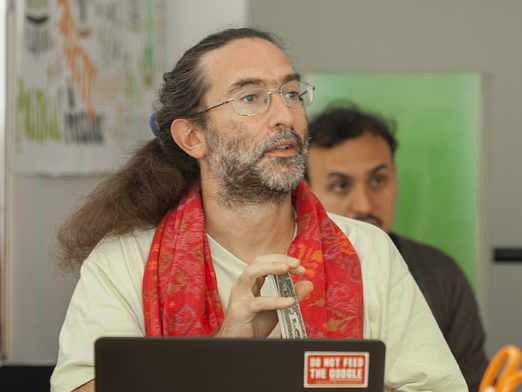The usual mechanism of exchange in daily life and in cryptocurrency markets is using an intermediate commodity called money. If you want to swap the goods and services (G&S) you produce for other G&S you put your G&S on a bilateral market and swap it for money with whoever wants to pay the most for it. Then you take your money into another market and swap your money for the G&S that you want. Since money is a commodity like any other, you don't have to swap G&S for G&S but can move money in and out of the exchange.
Each exchange will designate usually one (but sometimes more) commodities as money, meaning that it appears in all (or many) commodity pairs, enabling you to convert one G&S for another in only two swaps.
A decentralised exchange (DEX) is doing the same, but avoiding having to trust an institution and avoiding the laws under which institutions are governed.
A mutual credit exchange requires no money to mediate exchange, and therefore no need to procure that money before hand. You go the exchange to find counter parties, you provide your G&S and you take other G&S in either order,. Between those two transactions, one party is trusted to provide something back to (the members of) the exchange, and one party is trusted to take something from (the members of) the exchange. The exchange is of G&S for G&S. The differences are these:
| Normal | DEX | Mutual credit | |
|---|---|---|---|
| What is exchanged in one transaction? | Money for G&S | G&S for G&S | |
| Simultaneity | Simultaneous swap | Delayed swap | |
| Account balances | Only positive balances | Balance between limits, average zero | |
| Role of institution | Mo manage financial assets | No institution | To manage trading records |
| Who is trusted for what? | The exchange is trusted to hold assets | Developers and auditors are trusted that the DEX works as advertised. | Members are trusted to complete the swap. |
| Source of liquidity | Available money | Available trust | |
| Value of the 'money' | The most stable commodity because it has, by definition, the highest liquidity | Defined by the exchange | |
| Meaning of the 'money' | Money is property, owned by somebody | Money is an agreement, governed by its users. | |
| Reversibility | Requires legal intervention | All transactions are contingent on the community's agreement and can be nullified. | |
There is another key difference between the usual way of exchanging and the way needed for the solidarity economy, which concerns the value of money. In the usual exchange, money is a asset whose customary use is as a medium of exchange. As the most traded asset therefore, money should have the most stable value of all the assets being exchanged - it is the most liquid after all. But the value of the money is not stable by definition. The availability of money to a given market varies and its abundance or scarcity in that market actually interferes with the market itself, driving all prices up or down together.
In a mutual credit exchange there is no money and no quantity of money, so it is not subject to that kind of outside interference. Instead of a money there is only a unit of account, whose value can be defined in many ways, but is essentially a political question between the members wanting to exchange. The unit of account is used to measure how much each member is obliged to supply or take from the market in order to complete their exchange. In a currency exchange, the groups are unlikely to want their currencies to float against each other in a free market system. Instead they might rather agree on exchange rates, and use capital controls instead to maintain equilibrium. this leads to two more differences.
| Normal | DEX | Mutual credit | |
|---|---|---|---|
| Stability of the accounting unit | The most stable asset | Defined through a political process | |
| Balance achieved by | Supply and demand | Capital controls | |
There's one more difference I want to highlight, which is how mutual credit exchanges could scale into a global system. In the global marketplace, different exchanges specialise in different G&S from the street market which trades vegetables for money, to financial markets, oil markets, mortgage markets, cryptocurrency markets etc. All of these different institutions are joined into a global system because they use the same money, which moves easily from one market to another.
In my plan for the Credit Commons there is no valuable asset backed by the taxpayer that you can simply transport from any marketplace to any other marketplace. Instead there is a structure of credit relationships backed by people and organisations that know each other and depend on each other for trade. Each group is self organising and self-governing and as such needs the freedom to run its preferred accounting software on its preferred hardware in its preferred legal jurisdiction. Groups themselves make trading relationships with other groups, forming groups of groups. and transactions between these groups need to be, validated by all three entities, each group and the supergroup, be stored in all three places, provably the same.
With all of these differences it makes little sense to build a mutual credit exchange on a DEX or any conventional exchange software. Ideally we would need new software of the ilk of blockchain, Holo, or Ricardian contracts, but its not clear to me yet, whether any of these could do it.
Compared to these technologies, a credit commons software would have to:
- connect to other instances of itself in a tree structure.
- Work with the other instances to find paths through the tree.
- Relay a transaction along the path, storing it at every node involved if and only if all nodes validate, and return an error message if not.
Looking at the available technologies I'm not sure there's anything out there which could do that right now. Software in the commodity money paradigm can do it but only in a hacky way. Here's how:
First of all you have to create assets (tokens) out of nothing in the central exchange, give them a face value and give some to the participating members. This represents the credit limit of each member, the maximum they can spend over what they earning. Then you need to write a script or somehow prevent members from having too high balances - a different mechanism since you can't have negative assets. Then there aren't free markets in money. Exchange rates are adjustable only through a process of governance. So bids and offers and matchmaking work very differently

With this understanding it seems that most exchange software is a best, over-engineered for mutual credit exchange and at worst, the wrong tool for the job. So what software is right?
In some ways it looks like a job for a blockchain,but there's no need for one definitive ledger for all transactions. In some ways it looks like a job for Holochain, with each exchange having its own instance, but I don't think Holochains can link up in that way. In some ways it looks like a case for Ricardian accounting, but I need to explore further - I need to talk to experts! It could be that a whole new technology is needed...

Comments